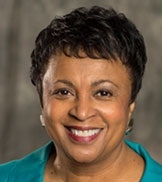You have /5 articles left.
Sign up for a free account or log in.

Carla D. Hayden
Enoch Pratt Free Library
Library groups on Wednesday endorsed President Obama’s plans to nominate Carla D. Hayden as the next librarian of Congress, saying she would bring much-needed experience with library technology to the institution.
In a statement, Obama said Hayden “has devoted her career to modernizing libraries so that everyone can participate in today's digital culture.” Hayden has served as CEO of the Enoch Pratt Free Library in Baltimore since 1993 and is widely credited with righting the library system’s finances, expanding its outreach efforts and launching new technology initiatives.
Under Hayden’s leadership, the Pratt Library became the first public library in Maryland to provide Internet access. Through grants and fund-raising, the library system founded a Center for Technology Training that offers free courses to Baltimore residents on basic computer skills, launched a bookmobile and ereader program, and renovated old branches and opened new ones, among other efforts.
If confirmed, Hayden would be the first black and first female librarian of Congress.
“The president could not have made a better choice,” Sari Feldman, president of the American Library Association, said in a statement. “Hats off to President Obama for nominating Dr. Hayden, a professional librarian uniquely positioned with the leadership and management skills and understanding of digital technology to make the Library of Congress the pre-eminent national library in the world, highly valued by and serving all Americans as a treasured resource.”
Hayden served as president of ALA between 2003 and 2004, and also has connections to Chicago. Before moving to Baltimore, she served as chief librarian of the Chicago Public Library. Her résumé also includes a four-year stint in higher education as assistant professor for library and information science at the University of Pittsburgh (the chancellor tweeted his congratulations).
Dan Cohen, founding executive director of the Digital Public Library of America, described Hayden as a “great choice for the job.” He said that Hayden was an early supporter of DPLA who served on its steering committee, and that she “is clearly an advocate for using all means (including digital means) to provide democratic access to our shared culture.”
The emphasis on Hayden’s library technology experience is a direct response to years of criticism of the leadership of the Library of Congress from people in academe and politics. Much of the criticism has focused on the library’s lack of digitization initiatives.
The library has been under interim leadership since James H. Billington, the 13th librarian of Congress, resigned on Jan. 1. Librarians of Congress serves 10-year terms.
Hayden’s strident opposition to the Patriot Act could be a potential roadblock to her confirmation, even if her views likely have strong support among academic librarians. As president of the ALA, Hayden in 2003 railed against the “possibility of surveillance, whether direct or through access to records of speech, research and exploration,” which she said “undermines a democratic society.” Teaming with the American Booksellers Organization, the Association of American Publishers and PEN American Center, the ALA in 2004 launched the Campaign for Reader Privacy to keep bookstore and library records private.
The U.S. Senate has already given Hayden the thumbs-up, however. Hayden and five others were confirmed by the Senate to the National Museum and Library Services Board, which advises the Institute of Museum and Library Services, in 2010.
Unlike that other nomination battle on Capitol Hill, librarian of Congress nominations rarely make for high-stakes drama. The Senate unanimously approved Billington, for example. Based on the library’s own records, the closest thing to a nail-biter would be the vote on Archibald MacLeish in 1939, who was confirmed with a vote of 63 to 8, with 25 not voting. The ALA has occasionally opposed nominees lacking library administrator experience, such as Daniel J. Boorstin in 1975, but even Boorstin was confirmed without debate.




